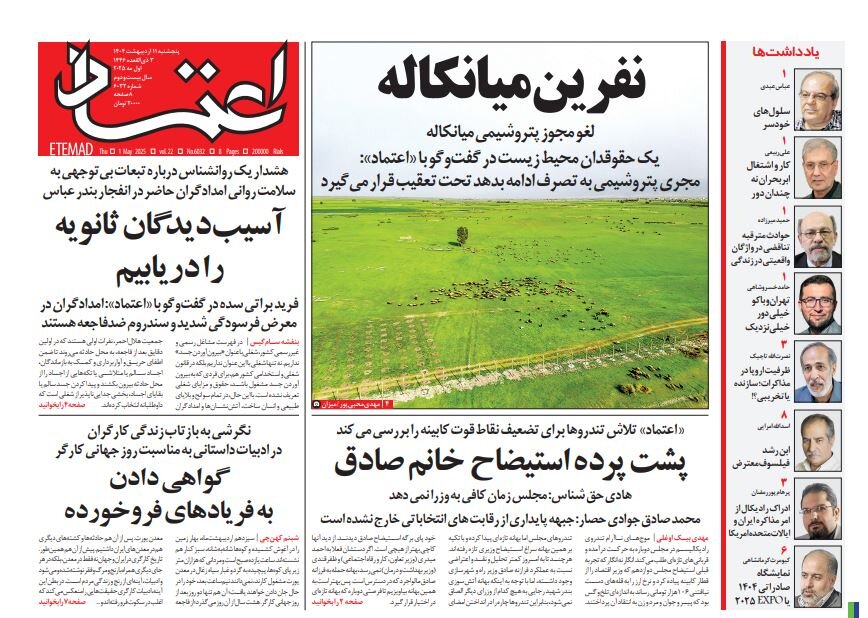Tehran – In the analysis, Etemad discussed the importance of the relationship between Iran and Azabaijan.
It writes as follows: Pezeshkian’s trip to Baku took place in sensitive circumstances after recent ups and downs as the relationship between Tehran and Baku needed new opportunities for repair and improvement. The Israeli regime’s intelligence reporting efforts in Azerbaijan and their malicious attempts to disrupt the relationship between the two neighbours are Tehran’s most important concerns. A problem that allows relationships to be cast shadows again without defining clear boundaries in the security field. Disagreements relating to Iran’s sensitivity to transport projects, particularly the development of the Zangezur region, are planned to change the geopolitics of the region, and other differences. In this situation, the involvement of Iranian companies in the reconstruction of the border regions to the fullest extent, creating transparent strategies to combat security threats, developing concrete economic projects, strengthening academic ties, and reconstructing Iranian companies in reconstructing the newly liberated region of the Republic of Azerbaijan will help to strengthen the ties. A trip to Baku in Pezeshkian could be an effective step to rebuild this neighborhood path if it leads to tangible results.
Hamshahri: Trump’s words and actions do not match
In the memo, Hamshali wrote and wrote a message of contradictory statements between Mike Waltz, the White House national security adviser who was fired from his post but was fired as ambassador to the United Nations, and Americans. The claim comes when Iran did not withdraw from indirect talks with the US, and last Saturday, after third round of consultations, the Omani Foreign Minister announced that it will be held next Saturday (May 3). However, recently, Washington has undermined the diplomatic process by imposing new sanctions on Iran. These sanctions are designed in line with the failed criminal policy of “maximum pressure” on Iran’s great nation. This is another clear evidence of the contradictory approach of American decision makers and the lack of goodwill and severity in pursuing the path of diplomacy. Therefore, the responsibility lies with the US side for the contradictory actions and conspicuous statements of American officials regarding Iran.
Ham Mihan: China’s support for Iran’s nuclear diplomacy
In the commentary, Ham Mihan discussed China’s support for Iran’s nuclear diplomacy. While supporting China’s nuclear diplomacy, Chinese Foreign Minister Wang Yi praises Tehran’s diplomatic efforts in its nuclear program. China previously played an important role in healing wounds between Iran and Saudi Arabia. Analysts see the move as a sign of Beijing’s desire to become an influential diplomatic power player in the Middle East. However, the recent crisis in Israel and Gaza, as well as Ansalara’s military operations against Israel-related commercial vessels in the Red Sea, challenge China’s ability to play a constructive role in managing “hot global issues.” China’s appreciation for Iran’s diplomacy demonstrates Beijing’s desire to deepen relations with Tehran and play a role in Middle East development. However, US sanctions and an increase in Trump’s military threat (to Iran) indicate a tension in the atmosphere of negotiations. China’s role as a mediator could be affected as the regional crisis intensifies.
Arman-e-Emrooz: Iran’s economy is waiting for a green light from negotiations
Arman-E-Emrooz has investigated the situation in the Iranian market in light of nuclear negotiations between Iran and the US. The paper states: Iran’s economy awaits nuclear negotiations for the fourth round. The market has been in a state of caution since the third round of negotiations between Iran and the US took place on Saturday (April 26th), which contrasted with the previous two rounds of negotiations. From a trader’s perspective, the markets these days are optimistic about negotiations, but there are traces of fear that could be exciting again with some news. However, market analysts believe that even if a possible contract is reached between Iran and the US, the banking system will not be able to use Swift due to Iran’s non-membership in the FATF, which will continue to be accompanied by financial trading issues. The market after the fourth round of negotiations between Iran and the US will fluctuate greatly depending on whether the outcome of the negotiation is positive or negative, and traders are already waiting for what the market situation and price will look like if the outcome of the fourth round of negotiations is positive.

